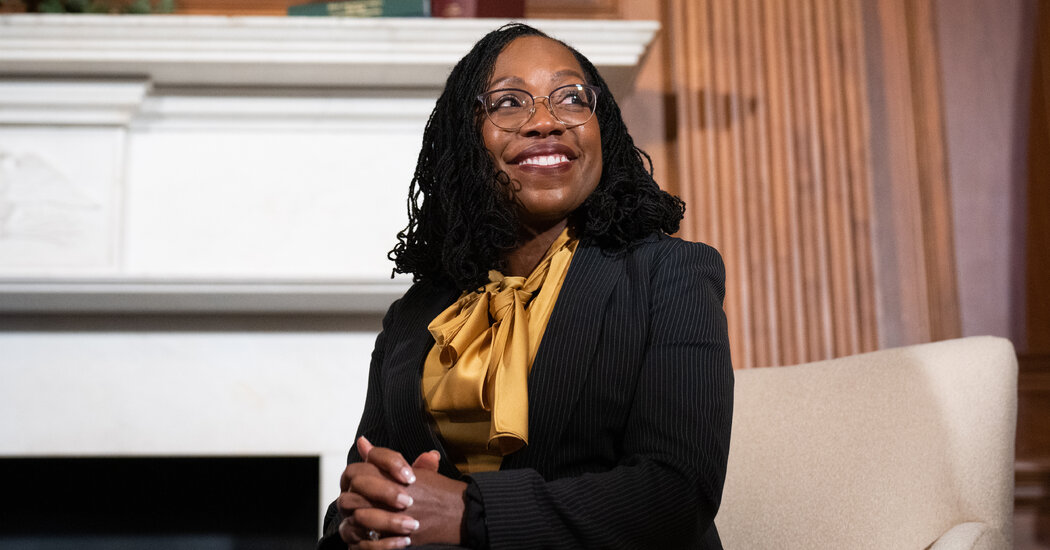
WASHINGTON — The confirmation hearing for Judge Ketanji Brown Jackson will begin on March 21, the chairman of the Senate Judiciary Committee announced on Wednesday, as the Supreme Court nominee began meetings with senators in a quest for bipartisan support from the polarized Senate.
The chairman, Senator Richard J. Durbin, Democrat of Illinois, revealed the timetable and joined Senator Chuck Schumer, Democrat of New York and the majority leader, in urging Republicans to consider voting for Judge Jackson even though nearly all of them voted against her confirmation last year for an appeals court post.
“She deserves support from the other side of the aisle,” said Mr. Schumer, who repeatedly called the nominee “amazing” following a private session with her just off the Senate floor. “I am hopeful that a good number of Republicans will vote for her, given who she is.”
Judge Jackson, 51, has been confirmed by the Senate three times before. The last time was in June, when the 53-to-44 vote confirming her to the influential U.S. Court of Appeals for the District of Columbia Circuit included three Republicans in support.
Yet the votes of even those Republicans are not assured this time around. Once routine, strong bipartisan support for a Supreme Court nominee has become a thing of the past. Changing that dynamic will require Judge Jackson, the first Black woman ever nominated to the court, and Democrats to mount a persuasive case that she is highly qualified and merits a court seat even if Republicans see her as too liberal.
Believing that the judge is her own best advocate, Mr. Durbin said she would be available to all members of the Judiciary Committee before the coming hearing as well as other lawmakers who want one-on-one meetings. One Republican whom Democrats see as a potential vote for Judge Jackson is Senator Susan Collins of Maine, who voted to confirm her last June. Ms. Collins is scheduled to meet with the judge next week.
“It is absolutely essential that I sit down and interview her,” Ms. Collins said on Wednesday.
Mr. Durbin said he had reached out to a handful of other Republican senators who he thought also might vote for Judge Jackson. Democrats also say that an extensive questionnaire that the White House returned to the judiciary committee on Monday should help Republicans get a full picture of Judge Jackson, as it details her opinions in more than 500 district court cases and a wealth of other information.
“For those who want to know who she is and how she thinks, we have lots of evidence,” said Mr. Durbin.
The 24 days between the president’s announcement of Ms. Jackson’s nomination and the start of her hearing is about half the time of most nominations in the recent past, but Republicans set a new precedent of 16 days when they rushed through the confirmation of Justice Amy Coney Barrett just before the 2020 presidential election.
“It is tough for them to argue we are doing anything particularly different,” Mr. Durbin said.
Senator Charles E. Grassley of Iowa, the senior Republican on the Judiciary Committee, who met with Judge Jackson on Wednesday afternoon, said his goal was to “have a fair process, a dignified process.”
“I just think that we’re going to meet our constitutional responsibility of advice and consent with dignity and fairness and most importantly, thoroughness,” he said.
Judge Jackson also met with Senator Mitch McConnell, Republican of Kentucky and the minority leader, who has questioned what he calls her “thin” appellate record from her year on the appeals court as well as her backing from progressive activists who have called for expanding the nine-member court or making other changes to dilute the influence of its six-member conservative majority.
“One has to wonder why these left-wing organizations worked so very hard to boost Judge Jackson for this potential promotion,” Mr. McConnell said on Tuesday before his meeting with the nominee.
Participants in the courtesy meetings typically tend be tight-lipped about details of the discussions, and Wednesday was no exception. But Doug Jones, the former Democratic senator from Alabama who is serving as Judge Jackson’s “sherpa” in guiding her through the Senate, said the first day went well.
“It was a very good day; very, very pleasant meetings,” Mr. Jones told reporters, saying that the sessions so far had focused on her personal background as well as what he called her “impeccable credentials.”
“This was a really good start,” said Mr. Jones. “And we have been anxious to get this process going, and today was a good day to get it started.”
Like others in both parties, Mr. Jones said he expected the upcoming hearing to be less tense and toxic than recent confirmation battles, particularly the showdown over Justice Brett M. Kavanaugh.
“I think it’s going to be very respectful, regardless of what may have happened in the past,” Mr. Jones said. “That’s a testament I think to her as much as anything.”
Following the usual practice in such high-profile confirmations, Mr. Durbin said the first day would be devoted to Judge Jackson’s opening remarks and those selected to introduce her, and hearing from the 22 members of the Judiciary Committee. Senators will then question Judge Jackson over the following two days. Mr. Durbin said he hoped to conclude the hearing on March 24 after testimony from outside witnesses.
If all goes according to plan, the schedule will allow for a full Senate vote on the nomination before a two-week recess scheduled to begin on April 8. Acting by that date remains the goal of Senate Democrats even though Justice Stephen G. Breyer, the justice Judge Jackson would replace, might not formally retire until this summer, when the Supreme Court’s current term ends.
“There’s no reason to wait,” said Mr. Durbin.
Though they are increasingly hopeful of winning at least some Republican support for Judge Jackson, Democrats are determined to see her confirmed regardless.
“She belongs on the court,” Mr. Schumer said.




